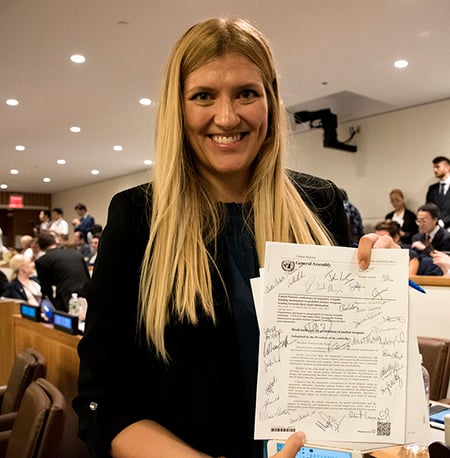International Campaign to Abolish Nuclear Weapons
Interview
The call from Oslo, October 2017
Listen to when Executive Director of ICAN Beatrice Fihn receives the news that International Campaign to Abolish Nuclear Weapons has been awarded the 2017 Nobel Peace Prize.
Telephone interview, October 2017
Telephone interview with Beatrice Fihn, Executive Director of ICAN, following the announcement of the 2017 Nobel Peace Prize on 6 October 2017. The interviewer is Adam Smith, Chief Scientific Officer of Nobel Media.
Beatrice Fihn describes the significance for ICAN of receiving the Nobel Peace Prize. In the interview, recorded immediately after she had heard the news, she also describes the groundswell of public opinion bringing new momentum to efforts to ban nuclear arms, commenting: “The cold war is over a long time ago, we can no longer accept these weapons.”
Interview transcript
[Adam Smith]: First of all congratulations on the award of the Nobel Peace Prize to ICAN.
[Beatrice Fihn]: Thank you, this is very, very surreal. [Laughs] I’m sorry.
AS: In their statement the Norwegian Nobel Committee describe a new momentum behind efforts to rid the world of nuclear weapons. Where do you think that new energy is coming from?
BF: I think it comes from just mobilising people around the world. I think with 21st century, having, using weapons of mass destruction to kill civilians is no longer acceptable. The Cold War is over a long time ago, we can no longer accept these weapons and I think that perspective has really mobilised a new generation of campaigners and the people who have been working on this for a very long time.
AS: Last month the majority of nations voted to adopt a new treaty prohibiting nuclear weapons. That has still to be ratified but what do you think the treaty will achieve when ratified?
BF: I think it will achieve a lot of pressure on states to sign the treaty. There’s a lot of governments who have not yet signed it so it increases the pressure on them. It stigmatises nuclear weapons. It declares under international law that these weapons are unacceptable and now illegal as well, so I think it’s a very strong signal to nuclear arms states that they have to disarm and it’s not just, it’s not just a symbolic treaty, it will have concrete impact on policies and practice.
AS: Thank you. And what do you think the award of the Nobel Peace Prize will do for your work at ICAN?
BF: Oh it will mean everything for us. I think it’s really, you know, we’re a small organisation. We have a lot of organisations that are members but have worked with little resources and lack of media attention to this issue and kind of ignored by mainstream media so I think this will really, this will mean the world to us. This is going to change everything.
AS: And ICAN is a collective of worldwide partner organisations isn’t it?
BF: Yes we are 468 organisations. In 101 countries.
AS: That’s truly a worldwide movement.
BF: Yes.
AS: And lastly, if individuals want to get involved in your campaign, what can they do to help?
BF: I think they can get really active, demand their governments to sign this treaty and to ratify this treaty. Make sure to challenge policies that rely on nuclear weapons, even in countries that don’t have nuclear weapons that are part of nuclear weapons alliances. Countries can sign this treaty and should sign this treaty and should reject nuclear weapons. So there’s lot of potential to get involved.
AS: So if people want to put pressure, what’s the best thing they could do?
BF: Demand their governments to sign this treaty.
AS: Right. Ok. And lastly you as executive director, how do you feel about this news?
BF: Completely overwhelmed right now. I feel like I can’t really think very much.. Extremely happy. This has been a collective work by so many people around the world for a long time and it’s just a really a huge honour for all of us to receive this.
AS: Once again many congratulations on the award and thank you very much for speaking to us. Thank you.
BF: Thank you very much. Thank you.

Beatrice Fihn, Executive Director of ICAN, with the signed UN Treaty on the Prohibition of Nuclear Weapons, 7 July 2017.
Did you find any typos in this text? We would appreciate your assistance in identifying any errors and to let us know. Thank you for taking the time to report the errors by sending us an e-mail.
Nobel Prizes and laureates
See them all presented here.
